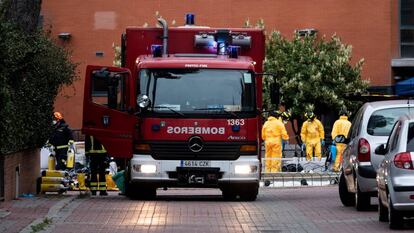Madrid Fire Department on coronavirus crisis in care homes: ‘There are bodies that no one has collected’
According to official documents seen by EL PAÍS, firefighters were called upon to remove 185 corpses from senior residences in the region

Between March 27 and April 17, when Madrid’s regional health system was at breaking point due to the coronavirus crisis, firefighters had to intervene in dozens of senior residences and remove at least 185 bodies that no one had taken charge of. Funeral homes were completely overwhelmed. Coffins were in short supply, as were body bags. Meanwhile “unattended” corpses piled up for so long that official forms included the option of indicating that a cadaver had spent “36 hours or more” without being transferred, according to official documents to which EL PAÍS has had access.
“You have to prioritize the removal of the deceased [in residences] that no one has collected,” says one of the documents, dated March 27, when Spain was approaching the peak of the pandemic.
When the coronavirus enters a residence, in a short amount of time, a large number of residents, if not all, are infected, and there is a significant number of fatalitiesInternal memo from the head of the Madrid Fire Department
“I want you to understand how critical the situation in the region’s senior residences is,” reads an internal memo from the head of the Madrid Fire Department, dated March 27. “The [department] of social policy tells us that when the coronavirus enters a residence, in a short amount of time, a large number [of residents], if not all, are infected, and there is a significant number of fatalities.”
The memo continues: “Of the 476 senior care homes, 37 are seriously affected and another 32 will be in this state in a few days. In addition, there are some residences for the disabled (13 in a critical state) which have nearly identical problems.”
“We have received an order from the premier [of Madrid, Isabel Díaz Ayuso] to collaborate with other services to control this dreadful situation, prioritizing the removal of deceased people who have not been collected by anyone. Initially we will require the one-off collaboration of volunteers but we will transfer this at once to the Civil Guard so that they can process and resolve these issues on a routine basis.”
During the worst moments of the crisis, care homes became a death trap for residents. With hospitals overwhelmed, not every elderly patient who needed medical attention was transferred. Nor did the regional government provide more medical support to these centers. The depth of the tragedy is reflected in the figures.
Since the beginning of the pandemic, a total of 8,236 people have died in Madrid’s social service residences, which include homes for the elderly, the disabled and the mentally ill. This figure represents fatalities from all causes. Of this number, there were 5,987 coronavirus-related deaths. And more than 1,200 cases were being monitored by firefighters, according to union sources. Given the removal of bodies was taking longer than it should, the Fire Department was on alert in case it needed to intervene. The firefighters’ efforts were concentrated on four dramatic days: between April 4 and 7, they removed an average of 23 bodies a day.
“It was an atrocity and a tragedy,” says Israel Navesco, the head of the Firefighter Union, which is part of the regional CSIT union for Madrid public workers.
Firefighters from Las Rozas, Leganés and Fuenlabrada were tasked with collecting the bodies, focusing on those that had been left for more than six hours. In Aldea del Fresno, Coslada, Valdemoro and Tres Cantos, the firefighters worked on disinfection and inspecting centers and ambulances.
Lack of resources
“The number of deceased has well exceeded the normal capacity of material resources [required] for their management and transfer,” reads a contract for €20,570 for the purchase of 200 body bags to move the corpses.
“The Fire Department has been tasked with the revision and disinfection of critical medical facilities such as medical centers and residences,” reads a €132,575.26-contract to adapt five trucks to be able to transport the industrial equipment needed to disinfect the facilities.
“The equipment and clothing used on shift must be completely and permanently disinfected, and 22 washing machines and 22 dryers are need,” says a third contract for €27,493.14
Between the end of March and beginning of April, the Madrid region was overwhelmed with thousands of coronavirus cases and hundreds of deaths a day. The bodies of many elderly patients were left abandoned. Until the firefighters arrived.
English version by Melissa Kitson.
Tu suscripción se está usando en otro dispositivo
¿Quieres añadir otro usuario a tu suscripción?
Si continúas leyendo en este dispositivo, no se podrá leer en el otro.
FlechaTu suscripción se está usando en otro dispositivo y solo puedes acceder a EL PAÍS desde un dispositivo a la vez.
Si quieres compartir tu cuenta, cambia tu suscripción a la modalidad Premium, así podrás añadir otro usuario. Cada uno accederá con su propia cuenta de email, lo que os permitirá personalizar vuestra experiencia en EL PAÍS.
¿Tienes una suscripción de empresa? Accede aquí para contratar más cuentas.
En el caso de no saber quién está usando tu cuenta, te recomendamos cambiar tu contraseña aquí.
Si decides continuar compartiendo tu cuenta, este mensaje se mostrará en tu dispositivo y en el de la otra persona que está usando tu cuenta de forma indefinida, afectando a tu experiencia de lectura. Puedes consultar aquí los términos y condiciones de la suscripción digital.









































